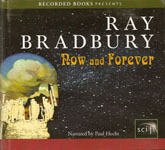
 Now and Forever
Now and Forever
By Ray Bradbury; Read by Paul Hecht
4 CDs – 4.75 hours – [UNABRIDGED]
Publisher: Recorded Books
Published: 2008
ISBN: 9781428198258
Themes: / Fantasy / Collection / Novella / Small town / Nostalgia / Starship / Aliens / Telepathy /
In some ways the most interesting part of the two novellas that make up this book are Ray Bradbury’s introductions. He explains that both “Somewhere the Band is Playing” and “Leviathan ‘99” have their origins in his long ago days as a Hollywood screenwriter. These explanations hang on in the listener’s mind and provide insights and color for the stories that follow.
“Somewhere the Band is Playing” evokes the memories of the idyllic towns that Bradbury loves to write about, a la “Mars is Heaven” in The Martian Chronicles. One wonders if this bucolic turn-of-the-20th-century setting has its roots in his own youth in Waukegan, Illinois. The story is told by James Cardiff, a reporter who awakens one morning mysteriously drawn to Summerton, Arizona, which does not appear on the map although the train stops there. As he explores the town he finds it is full of mysteries that seemingly defy explanation such as adult inhabitants, but no children; a graveyard, but no dates of death on the tombstones. This story gently invites the listener to consider questions of immortality, paradise, and the consequences of our choices.
Moby Dick was the inspiration for “Leviathan ‘99”. In Bradbury’s tale, the white whale has become a huge comet, Ishmael is a young astronaut, Queequeg is a mind-reading alien, and Captain Ahab a nameless starship captain who is madly pursuing his nemesis after their original encounter left him blind. Ray Bradbury is known for his love of words which comes through strongly in in the Shakespearean-like soliloquies through which The Captain shows his descent into madness. I especially liked the use of Quell the mind-reader to show us The Captain’s true frame of mind when he was elsewhere. Even the reader who has barely a speaking acquaintance with Moby Dick will appreciate the parallels that Bradbury employs and thrill to the question of how he will choose to end the story.
Neither of these stories has the depth of Ray Bradbury’s great works such as Something Evil This Way Comes or Fahrenheit 451. However, they are novellas and perhaps it may be better to compare them to his short stories. On a first listening, they left me rather flat, wondering, “Is that all there is?” However, further contemplation made it obvious that there is a common theme of man’s blindness, the wonders that are just within reach, and the consequences of our choices. I would not recommend these as a first outing for someone who hasn’t read Bradbury before but to the reader who already appreciates this author, they have much to recommend them.
Paul Hecht’s narration is perfect and his ability to voice characters is exceptional. It is a mystery to me how such a deep voice can portray a woman so well without using falsetto or sounding ridiculous but Hecht does it with little effort. His characters spring to life within the listener’s mind and add depth to the story.
Highly recommended for those who enjoy Ray Bradbury’s writing.
Posted by Julie D.
ed. – This is our first review of an audiobook from the new Sci-Fi imprint from Recorded Books. Click here for a look of what’s coming up from this imprint, which is shaping up to be a fine selection from the literary end of science fiction and fantasy.

Great first review Julie! Looking forward to the next! :D
Thank you, kind sir! I’ve already turned in another review (making up for lost time).
I found the hardcopy of this book at my local library and, being a HUGE fan of Bradbury, checked it out. I meant to write a review, but had to return the book–out of sight, out of mind.
Personally, I enjoyed “Leviathan 99” more than “Somewhere a Band is Playing,” probably because I think “Leviathan” plays to Bradbury’s strength–his love of language and his knowledge of classic American literature. “Somewhere” just felt unfinished to me.
Years ago we listened to an audiobook of “Martian Chronicles,” read by Mr. Bradbury himself. Since “Chronicles” was originally several short stories, Mr. Bradbury commented on his inspiration for each, giving insight into each chapter. I enjoyed his comments then, too.